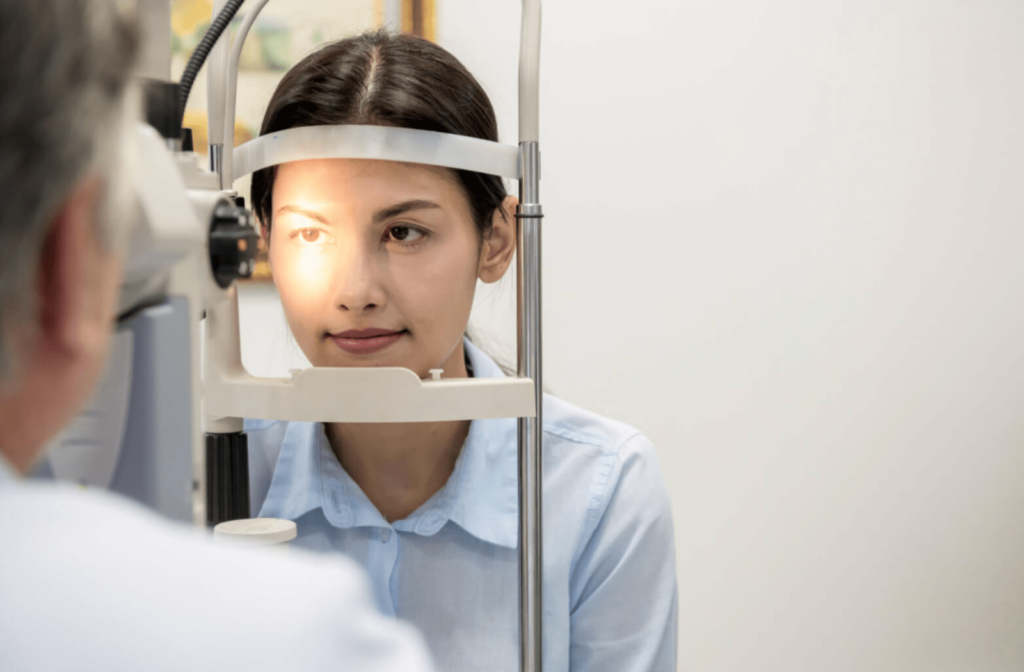Many people do not often go for regular eye exams. Depending on your age, your eye exam frequency can vary.
For adults between 19 to 60, it is essential to have regularly scheduled eye exams every two years, even if there are no serious concerns.
Depending on your age and the condition of your eyes, an eye exam will take about 60 minutes. Your optometrist will be able to cover a lot through this, but your exam could run longer depending on the issues that you need to discuss with them. Should you find that you have a growing concern, you should consult with your optometrist about how frequently you visit so your health can be monitored.
Why Should I Have an Annual Eye Exam?
An annual eye exam will help to detect any problems with your vision at an early stage. Often, your optometrist can detect certain conditions before they become too severe.
From early childhood to adulthood, your optometrist will be looking for different issues as your eyes as you age.
Childhood
During the early stages of childhood, the development of your eyes is essential to monitor. In toddlers and children under three years of age, optometrists will be looking for such things as:
- Lazy eye or crossed eye
- Misaligned eyes
- Myopia (nearsightedness)
- Hyperopia (farsightedness)
Between the ages of 3 to 5 years, children’s eyes will undergo a more comprehensive exam. The exam ensures that your child’s eyes and vision are developing properly and there are no signs of concern. The optometrist will look for early signs of eye diseases and other eye conditions.
For school-aged children, there are a lot of concerns that can arise. If you are taking your child to an eye doctor, it is essential to notice if they are complaining about some irritations or frustrations at school or in their daily lives, as it could indicate possible vision problems. Some issues to keep an eye on include the following:
- Eye discomfort or fatigue
- Excessive eye rubbing or blinking or rubbing one eye
- Headaches
- Avoiding reading or holding material closer to their face
- Short attention span
These could be early signs of a change in your child’s vision, and you should reach out to your eye doctor if you notice any of these signs.
Adults & Seniors
For adults around the age of 40, there can be significant changes to vision and eye health. Many patients will notice changes in their vision due to aging.
At 60, you will need to have your eyes checked more frequently. If you are affected by some of the following conditions, you will need to see your optometrist even more often:
- If you wear contact lenses or prescription corrective glasses
- Have certain diseases, such as diabetes, that can increase your risk of eye disease
- Family history of eye disease or vision problems
What Eye Conditions Can My Optometrist Detect?
While many patients think that optometrists will only be able to detect and care for changes in your eyes and vision, there are other health issues that your optometrist can detect through regular eye exams. Some conditions and diseases that can be detected are:
- Aneurysms: A bubble in the wall of a blood vessel. An aneurysm can be detected through severe headaches or loss of facial function in parts of the face.
- Cancer: Certain types of cancer, such as blood, tissue, or skin, will affect the outer part of the eye or eyelid.
- Diabetes: If there are leaks or yellow fluid behind the retina, these could be indicators of the disease. Often, diabetes can be detected before the patient has been diagnosed.
- Heart disease: Typically, people with a history of heart disease in their family will have signs when their optometrist does comprehensive exams. There can be signs or marks left behind in the eye of the stroke.
- High blood pressure: Blood vessels behind the eye that have unusual kinks or bends can indicate high blood pressure.
- STDs: Various sexually transmitted diseases can be detected from an eye exam because they affect layers of the eye.
- Thyroid disease: If your eyelids are retracting or your eyeballs are protruding, these could be indicators that you are suffering from thyroid complications.
- Vitamin A deficiency: Night blindness and dry eyes are often signs of a vitamin A deficiency in your system.
- Rheumatoid Arthritis: Often, this disease is presented with severe pain and redness in the eyes.
Schedule Your Next Eye Exam with Toronto Centre Eye Care
If you have not had an eye exam for a while, your optometrist will need to review your medical history. Let your optometrist know all your concerns and health issues, even if you think they might not be necessary. Your health is important to us, and the optometrist at Toronto Centre Eye Care wants to ensure that they can ensure your health is in top condition.
If you are a new or active patient, the doctors are here to help you. Book an appointment today to learn how our optometrists can help you.



